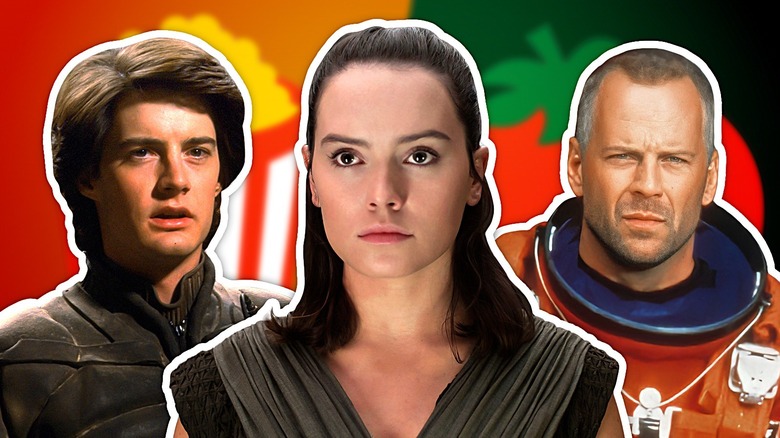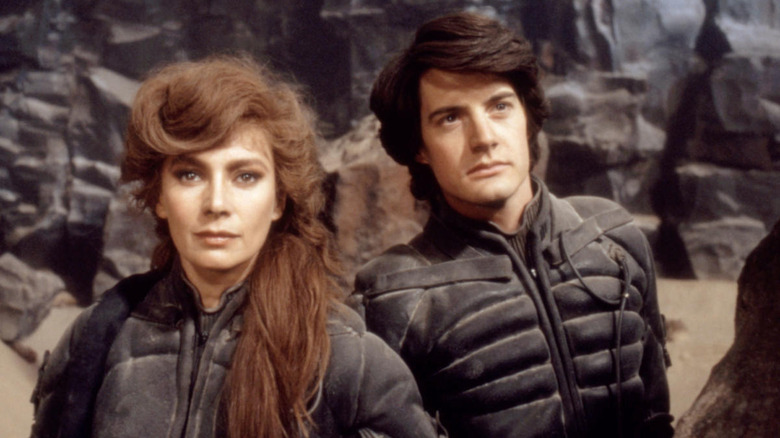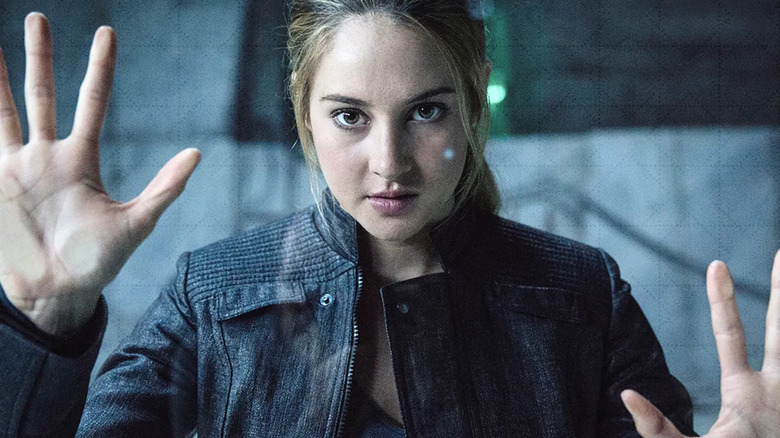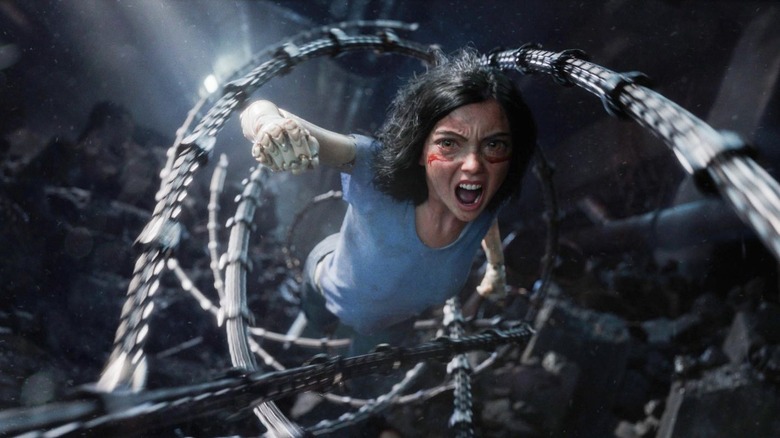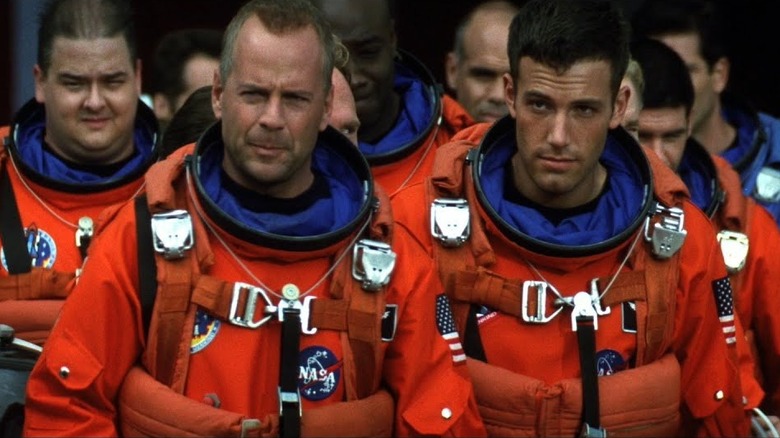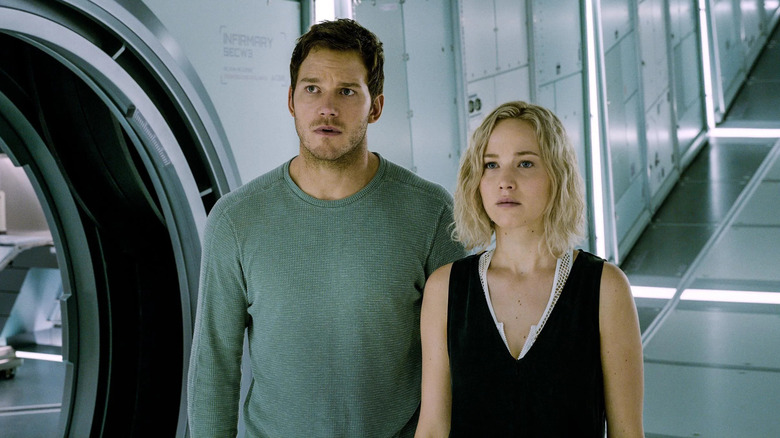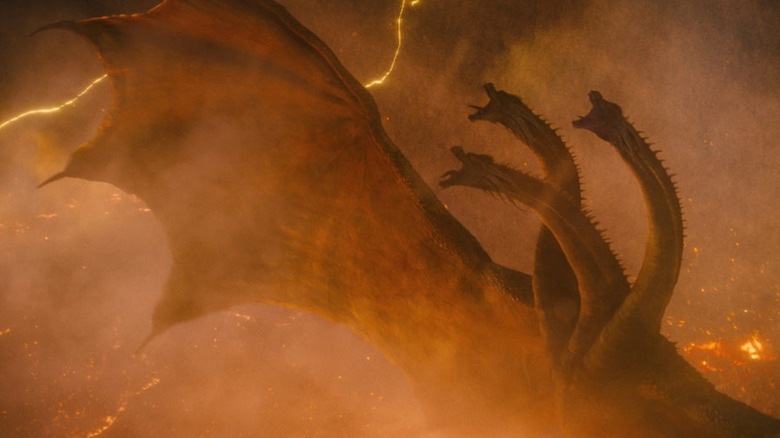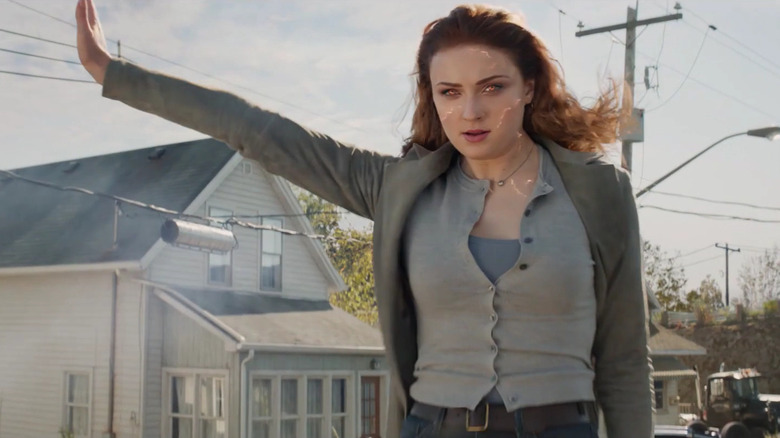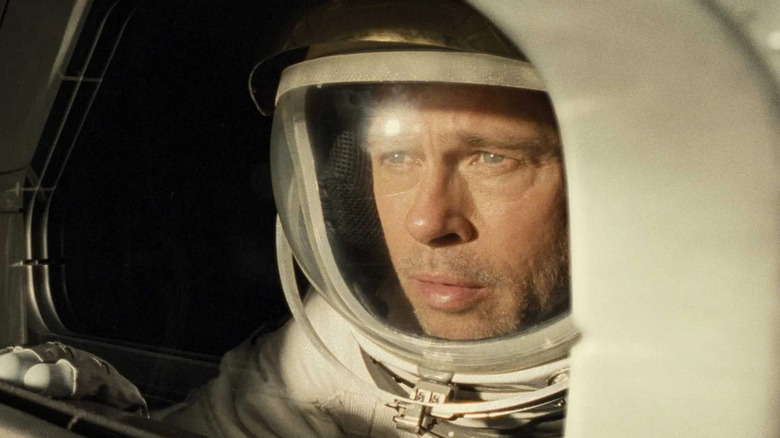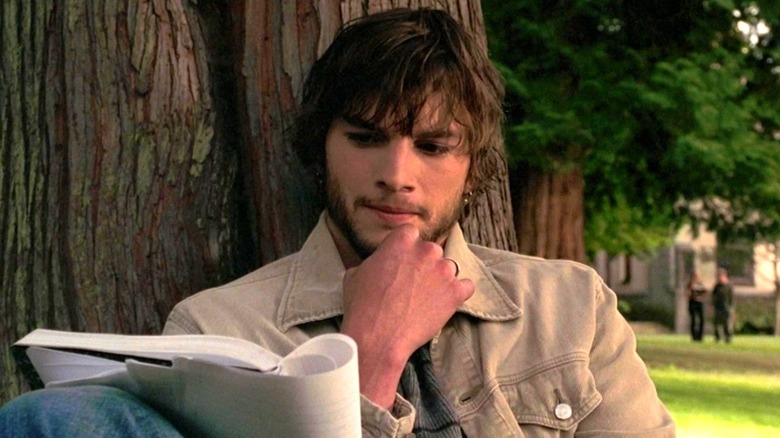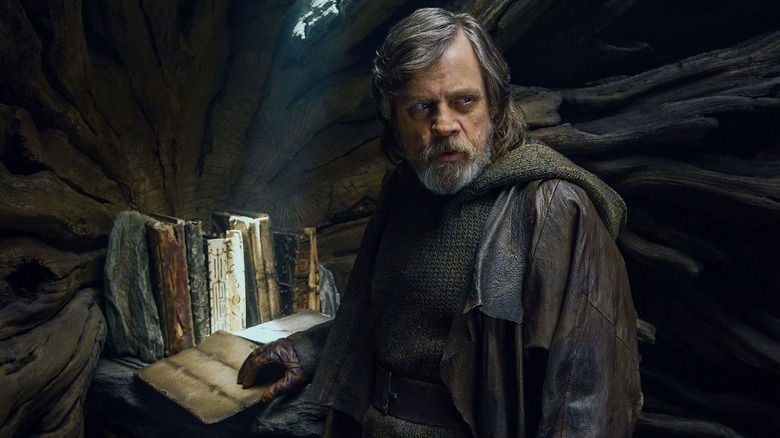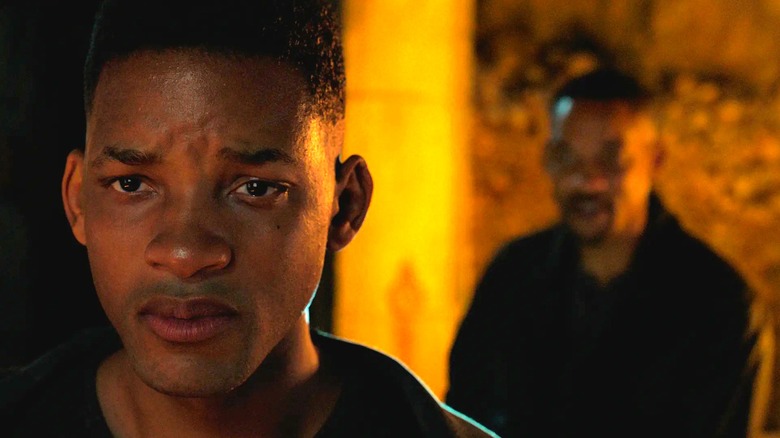Why These Sci-Fi Movies Had Huge Gaps Between Critics & Audiences On Rotten Tomatoes
Recently, Rotten Tomatoes introduced the new "Verified Hot" label to their audience-polled Popcornmeter. Should a film's audience score rank above 90%, they will receive a new badge of honor. Yes, despite the website's consistent fallibility to review bombing, on top of their already flawed and frequently-gamed system, the widely-revered review aggregate is still making steps to gain more credibility, yet all it's doing is further dividing critics and audiences. This heated topic of discourse continues to oscillate between "critics don't know how to have fun" to "audiences are too stupid to be trusted," to the point that it has become a staple in the alt-right culture war.
It goes without saying that critics and audiences perceive films differently, but the nuances that explain why are far from black and white. In fact, there's a lot that can be deciphered from a large gap in critics and audience scores, and it isn't that one side is objectively right or wrong. It could be that a film's source material has a passionate fanbase, or that one actor's likability can provide goodwill to an otherwise flawed film. Sometimes, the critics are the fans. The important thing is to form your own opinion, but make sure you so with context.
For your perusal, here are some of the largest gaps between critics and audiences on Rotten Tomatoes in the sci-fi movie genre.
Dune (1984) (28% difference)
"Dune" is a hot topic these days, and not just because of Arrakis' blistering temperatures. Denis Villeneuve's two-part adaptation has kickstarted the next great sci-fi epic, with both entries ranking as Certified Fresh and Certified Hot by critics and audiences respectively. They dispelled any doubt over whether Frank Herbert's novels could be adapted to screen effectively, a concern first raised by David Lynch's initial adaptation in 1984. Currently sitting at 37% on the Tomatometer, the original "Dune" attempted to do everything in one-go and suffered for it. "In cramming a 500-page novel into a $140-million film, Lynch has salvaged the names and faces of Dune but lost its ideas, its social resonance, even its suspense," observed Scott Rosenberg for the Boston Phoenix.
On the other hand, Brian Eggert of Deep Focus Review noted that "'Dune' is ripe for cult adoration" in his Fresh review. This would prove prescient, as the film ranks Hot on the Popcornmeter at 65% and remains an '80s cult classic. User Travis M writes that "the worlds, the sets, acting, [and] costumes still look great to me all these years later." Say what you want about Lynch's abilities as a writer, but his technical craftsmanship helped bring Herbert's world to life for the first time in a meaningful way to fans of the novels. "I love the new version too," the user continues, "but it's standing on the shoulders of this version!" Despite some wonky visual effects, sci-fi fans will never give up an opportunity to let the spice flow.
Divergent (28% difference)
Each film in the "Divergent" trilogy sport fairly wide gaps in their RT scores; "Insurgent" and "Allegiant" each have a 30% difference between critics and audiences, yet both scores are still negative. The first film is the only one that managed to at least secure a Hot ranking on the Popcornmeter at 69%, though the critics got the franchise off to a rocky start with a 41% on the Tomatometer.
"Divergent" was released amidst the post-"Hunger Games" wave of young adult dystopian novel adaptations and certainly couldn't shake the comparisons. "'Divergent' wishes it had nearly the imagination, creativity and angst-ridden scope as its obvious competitor," wrote Frank Ochieng for SFcrowsnest. "Saved by Woodley and James' performances, 'Divergent' has every trope a teenage fan could ask for, and not much else," concurred David Brake of One Room with a View. You can't be too surprised that a film aimed at pre-teens didn't hit with a crowd of adult reviewers, but it still speaks to the shallow nature of Hollywood's YA-obsession.
Though 69% is not a rousing audience score, some RT users went to bat for "Divergent" amidst the criticisms. "Burger handles the usual young adult fare with a fresh hopeful and emotional take that is far superior to...'The Hunger Games,'" writes user matthew d. Fans found particular insight in how the film portrayed Tris' journey of embracing her "divergent" identity from an oppressive government. "I found the theme in the movie of thinking for, and being oneself an important message," writes michael t.
Alita: Battle Angel (30% difference)
Here is a rare instance in which both scores are positive, yet the gap is still suspiciously wide. Critics liked "Alita: Battle Angel" well enough to grade it Fresh on the Tomatometer, but only by a hair at 61%. Audiences, on the other hand, skyrocketed its audience score to 91%. Were the film released after Rotten Tomatoes introduced Verified Audience Reviews, it would have retroactively garnered Verified Hot status!
Many critics, such as Rick Bentley of Tribune News Service, believed the film had "no core of originality" and was just "a collection of familiar sequences." However, others like RogerEbert.com's Monica Castillo, could "power through any narrative bumps" thanks to "the visual bonanza cooked up by [director Robert Rodriguez ... [with] quickly paced action and bleak, yet colorful, imagery."
"You have to understand," writes user Lord B, "this is the only Manga Comic based movie that finally lived up to the printed hype." After a slate of mediocre attempts, from "Dragon Ball: Evolution" to "Death Note," here was Hollywood's first good live-action manga adaptation and fans shouted it from the rooftops. The #AlitaArmy movement began, and naturally, it helped the film's RT score. "I just love how passionate Alita is, and I hope to see a sequel very soon," wrote user Finn J with an all-caps "#ALITAARMY" call-out. The groundswell support was so strong that it put a sequel on the table, though its future is ambiguous at best.
Armageddon (31% difference)
Is it that shocking to see "Armageddon" on this list? The Michael Bay blockbuster was one of the many films that solidified the explosion-fueled director as critics' favorite punching bag. The film rests at a 43% critics score, with plenty of reviewers bluntly expressing their disdain. Beloved critic Roger Ebert called the film "an assault on the eyes, the ears, the brain, common sense and the human desire to be entertained." Yikes!
That said, some critics were already on the right side of history upon the film's release. "No one in his or her right mind is going to take this juggernaut explode-o-thon seriously," wrote Marc Savlov for The Austin Chronicle. "It's big, it's stupid, it's pretty kickass." Audiences would agree, for they awarded the film a much kinder 73% score on the Popcornmeter. "It is filled with good actors that play it over the top [because] the plot is so ludicrous," noted user Kelli S, "but that is the charm of the movie." Indeed, these big, dumb, and loud blockbusters do have merit. They serve as no-holds-barred entertainment that puts the emotional journey before plot and plausibility. "It delivers exactly what it should," wrote one unnamed user, "two hours of roller coaster action and snappy humor with fun characters you're rooting for. What else do you need from an action movie?"
Passengers (33% difference)
It's rare that a film earns the title of "stalker-in-space love story," yet that's exactly how Sarah Cartland described "Passengers" in her rotten review for Caution Spoilers. It's a sentiment shared by many critics, who collectively placed the film at a 30% Tomatometer score. The decision to have Jim (Chris Pratt) awaken Aurora (Jennifer Lawrence) for his own gain despite knowing she will die because of it is a major part of the film's conflict, yet it translated as "some of the creepiest storytelling decisions in a long time" according to Sean Mulvihill of Fanboy Nation. Critics were quick to praise Pratt and Lawrence as naturally gifted actors, but their chemistry wasn't enough to save the film from amassing widespread backlash.
Fans, on the other hand, were far more forgiving with their 63% audience score. "Don't believe the rotten rating," wrote RT user Ben C. "The story did a great job of capturing what the characters would do in their situation." User St R writes that "the acts of the male lead are not spun as right or just [but are] quite rightly depicted as a wrong thing," though Steven V claims "[he] never did anything that felt irredeemable." This kind of debate would surely please director Jon Spaihts, who told io9 that he wanted the film's moral dilemma to "[leave] people room to argue about what they would have done." I guess critics are not the only movie lovers who dare to think critically, after all.
Godzilla: King of the Monsters (41% difference)
After Gareth Edwards kicked off the MonsterVerse with 2014's "Godzilla," a kaiju movie disguised as a harrowing disaster movie, the film received a number of criticisms, most notably that there wasn't enough of the title character. In a substantial redirect, Michael Dougherty dialed everything up to 11 with "King of the Monsters," including the action, the number of speaking roles, and, of course, the monsters.
The result was a film that landed at a 42% critics score. Mike McGranaghan summarizes much of the critics' issues in his review for The Aisle Seat, writing that "too many under-developed characters populate the story, too many plot points are crammed in, and the special effects are bludgeoning." It is yet another case of alleged style over substance, so how did the film earn an 83% audience score, nearly double what the critics ranked it? Hannah Lodge of The Beat provides some insight, "The joy you get out of 'Godzilla: King of the Monsters' may depend largely on how much goodwill it earns from you with the kaiju clashes."
As it turns out, Godzilla fans have a lot of goodwill to give, especially when you photorealistically render fan-favorite characters like Mothra, Rodan, and King Ghidorah in gigantic kaiju clashes. Fans frothed at the mouth over the film's homage to Toho's original creature features, to the point that some consider this one of the franchise's greatest films. One unnamed user wrote that "this is the Godzilla film every kid in the '70s wished existed. Best film of its kind, ever."
X-Men: Dark Phoenix (42% difference)
The rise and fall of 20th Century Fox's "X-Men" reboot series will eventually be studied in Hollywood's history books. After two universally-enjoyed entries in "First Class" and "Days of Future Past," the franchise lost some critical love with "Apocalypse" and altogether crashed and burned with "Dark Phoenix." The company's second attempt to translate the Dark Phoenix Saga to the silver screen somehow fared even worse than the first; director Simon Kinberg's original plan was to film the story as a duology, but the failure of "Apocalypse" forced him to haphazardly rewrite and reshoot the film to work in one go. "'X-Men: The Last Stand?' It now looks as accomplished as 'Batman Begins,'" writes Matt Brunson of Film Frenzy. His take was a common one, leading to a shockingly dismal 22% critics score.
With a 64% audience score, the lowest in the rebooted series, some fans shared the same sentiment. "I do love a lot of parts about this movie [but it's] hard not to ignore the flaws," wrote one unnamed user. "You take the good with the bad." Many other fans simply loved this cast of characters too much to not feel nostalgic despite the series' unceremonious end. User Matthew B wrote that "as a next chapter of these character's [sic] journeys it's emotionally rewarding," while user Exie L described it as "a good bittersweet end to Professor X and Magneto's story." James McAvoy and Michael Fassbender will always remain fan-favorite versions of these beloved characters, fiery franchise mess be damned.
Ad Astra (43% difference)
The slow burn space drama has become a niche but significant subgenre in sci-fi, however they aren't always welcomed with open arms. Some, like "Gravity," swiftly surpass the Fresh and Hot thresholds. Others, like "Spaceman" or "High Life," see mixed results. "Ad Astra" sits comfortably in that latter category, sitting at an 83% critics score and a 40% audience score. RT user ASDasd S described it as "a snooze fest with good visual affects [sic]," while user Stoner J wrote that "the action sequences are bad ass [sic], which almost outweighs the terribly slow, repetitive, self-reflecting narrations." Indeed, even Brad Pitt's star power made it difficult for some to swallow the film's incessant voiceover, which director James Gray later revealed was a result of studio interference.
While casual viewers couldn't get on board with Gray's more cerebral space story, critics ate it up. Siddhant Adlakha observed for FirstPost that "as much 'Ad Astra' is an interstellar adventure, it's a tale rooted in the emotional brokenness of men," while Loud and Clear Reviews critic Serena Seghedoni described the film as "intentionally emotionless" and "a stunning tale of identity, self-discovery and rebirth." Giving gorgeous visuals a deeper resonance — particularly one rooted in the deconstruction of masculinity and generational trauma — is always a winning formula for critics, especially when it's anchored by Brad Pitt. Some critics went so far as to deem his work in "Ad Astra" some of the best of his career.
The Butterfly Effect (47% difference)
Yeah, remember this movie? It has now been over 20 years since Ashton Kutcher made the jump to dramatic acting in 2004 with "The Butterfly Effect," a film that has largely escaped the zeitgeist, despite being contentious upon its release. The film was critically panned but embraced by audiences with a 34% critics score and 81% audience score. If anything, this film would make perfect "critics versus audiences" fodder, so why is it barely talked about anymore?
Perhaps it's because the critics got it wrong? Well, everybody says that these days, but this is one film where the arguments feel substantial. Peter Bradshaw of The Guardian wrote an apologetic retrospective in 2009 claiming that the film "fell victim to snobbery, and so many critical noses were turned up at it...that it never got the credit it deserved." And he's not wrong. You can't scroll the critics reviews on RT without seeing silly jokes like "Dude, where's your memory?" from Rolling Stone's Peter Travers, or Thomas Peyser's jab about Kutcher being "punk'd by the space-time continuum" for Style Weekly.
Meanwhile, audiences genuinely got invested in this time-jumping drama. "The plot is intricate and well-crafted," wrote user mattias s, "weaving together multiple timelines in a way that keeps everyone engaged." Some even spotlighted Kutcher and his talent, like user manic. m. "[He] believably portray[s] a character caught in an increasingly weird and paradoxical world that never quite matches up to his hopes." Certainly more thoughtful sentiments than the critics.
Star Wars: The Last Jedi (50% difference)
The "Star Wars" franchise is no stranger to divisiveness, but few films have caused greater disturbances in the force than "The Last Jedi." Sitting at a 91% critics score and a 41% audience score, the film's reputation is almost inseparable from its polarized fan response, to the point that no fan dares speak its name. Much of this stems from director Rian Johnson's bold creative choices, including his re-characterization of Luke Skywalker as a regretful hermit and the death of the trilogy's thought-to-be big-bad Supreme Leader Snoke.
Many fans, including RT user Devon M, cited outrage at these decisions, believing Disney "[handed] the reins over to somebody who cares more about 'subverting expectations' than they do about respecting the source material." Other critics, like Slash Film's own Jacob Hall, commended Johnson's courage to challenge viewers. "For the first time in a long time, here is a 'Star Wars' movie with a proper point of view, one delivered by a storyteller who is unafraid to shatter a universe he loves."
Though the debate behind "The Last Jedi" rages on to this day, the RT score may not fully reflect the public consensus. The film not only received an A CinemaScore and grossed over one billion dollars at the worldwide box office, but further investigation revealed it was the target of a review bombing campaign. The film's 6.9/10 IMDb rating suggests that, though "Last Jedi" detractors are certainly vocal, they remain a minority.
Gemini Man (56% difference)
Sporting one of the largest point disparities on Rotten Tomatoes, Ang Lee's sci-fi action drama "Gemini Man" sits at a 27% critics score and an 83% audience score. It's the kind of split that is so gaping it almost feels manufactured, yet many of the reviews on both sides boil down to the same pros and cons. Sheraz Farooqi's review for CinemaDebate puts it simply, "Gemini Man stumbles as its half-baked story and poor dialogue hinders solid performances and strong visuals."
It's no surprise that the critics weren't able to embrace the film's thrills and frills when the meatier material wasn't there. Most reviewers look for story and character as their top priorities when determining a film's quality, even in an action movie. General audiences, on the other hand, are a lot more lenient if the film's spectacle delivers. RT user Najee writes that the "plot was a bit predictable but that's to be expected," saying that "it was an enjoyable ride and packed with great chases and fight sequences" as well as "great CGI" in reference to the film's digital cloning of Will Smith.
Perhaps the film's greatest Popcornmeter asset was its star. Love for Will Smith is one helluva drug — he can still lead the yearly box office in a post-slap world — and "Gemini Man" is no exception. Many RT reviewers cite his dependability as a quality actor and action star, even if the rest of the movie can't match up to him, including user Xavier W, who wrote "Will Smith is Great Actor. Everything he's in I'm there!" Zero points for grammar, but at least he's honest.
